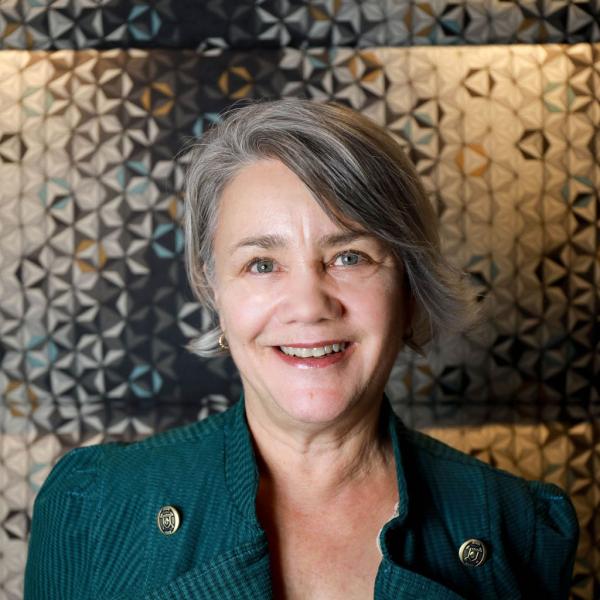Senators spar in Sundin Hall
Sundin Music Hall housed 300 spectators and a radio audience for the first face-to-face contest over a nationally competitive Senate seat.
November 13, 2018
In the wake of a political bomb scare, a deadly hate crime and calls for 15,000 domestically mobilized troops, U.S. Senator Tina Smith and MN State Senator Karin Housley met at Hamline for their first debate just a week before the national election—the first time in Minnesota history that the two candidates competing for a U.S. Senate seat have both been women.
Smith and Housley held a debate in Sundin Music Hall on Thursday, Nov. 1, before a WCCO radio audience as well as a packed house of 300 observers. President Fayneese Miller greeted all at the start of the event.
“We all have a duty. We all have to remember that there is more we have in common than we have that divides us,” Miller said.
Students likewise expressed an awareness at the larger national context.
“It’s very exciting for students here,” senior Ashley Thorne said. “But it’s also nerve-wracking with current events to bring all this together on our campus.”
Hamline University Student Council (HUSC) Secretary and junior Ray Doss emphasized this excitement.
“I’m really happy it’s hosted at Hamline, I think it’s good for us as a school, and I hope that this leads to more events like this.”
Bipartisanship and polarization were a reigning theme of the night as the two women competed for both urban and greater Minnesotan votes.
“I’ve worked hard to bring your voices and your ideas back to Washington D.C.,” Smith said, who was appointed to fill the Senate seat after Al Franken’s resignation last December. “There I’ve worked hard, and I’ve worked across the aisle to get things done for Minnesota.”
Housley positioned herself as representative of Minnesota’s silent center.
“One of the biggest issues that I’ve heard, when it comes to what’s on the minds of people of Minnesota, is they are sick and tired of politicians not getting anything done in Washington D.C. I’m sick and tired of it too. I’m sick and tired of the extremism and the partisan politics and the not getting anything done.”
Students’ policy concerns mirrored those of the state at large.
“I’d like to know about their differences in health care, immigration and gun control,” senior Sanjana Ketchum said.
Housley and Smith agreed that healthcare was Minnesota’s primary issue, but disagreed on the path to dealing with it. The former condemned single-payer, government-operated coverage and urged for a return to cross-state competition to lower consumer prices, as well as transparency in procedure costs at clinics and hospitals. The latter, meanwhile, pointed toward her own proposed legislation to crack down on the pharmaceutical industry’s manipulation of the market to keep cheaper drugs out of the competition. Likewise, Smith stated that it was essential for Medicare to negotiate drug prices and implement government assistance in expanding rural healthcare access.
They came to mutual agreements on a few points: that Minnesota should be a national leader in renewable energy; that climate change is occurring; that international trade agreements have harmed American workers; that the expansion of northern copper-nickel mining is important for the state economy; that negotiations with North Korea were a positive step; and that Saudi Arabia’s murder of Jamal Khashoggi should be condemned.
Housley adopted much of the new Republican strategy since 2016 of assuming the role of a conservative populist outsider, lambasting Smith as a career politician, “…a lot of talk, talk, talk…” with little action. In this same vein, she took a hard stance on immigration. “The biggest issue here is immigration…there is a clear difference on Nov. 6, my opponent is for open borders,” Housley said.
While there was an agreement for the need of immigration reform, Smith called for stronger border security and a path to citizenship, while Housley echoed the Trump administration’s positioning of the Central American migrant caravan as a national security threat.
“You heard [Smith] say it here tonight; that she’s for open borders, let the caravan in, she said she would let the caravan in, and I’m for securing our borders,” Housley said.
Regardless of their calls for bipartisanship and contentious agreement on a few issues, it was these final statements on immigration which seemed to color the night most. For Housley and national Republican candidates, it remained their hedge bet on securing support in the wake of national events which have been negative for the president’s standing in the polls. For at least some of Hamline’s students, it was the smoking gun for who emerged ahead in the debate.
“I think the person who used the much less racist rhetoric definitely came out on top,” Doss said.





